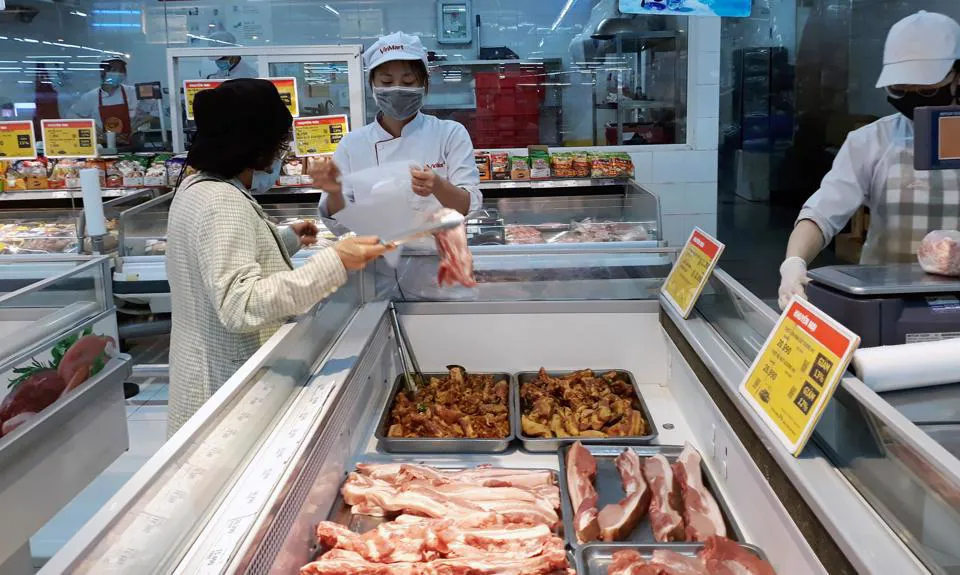Provinces and cities work to secure food supplies for year-end
The Vietnamese agricultural sector expects to secure sufficient food supplies for the market in the coming months.
Hanoi and other provinces are working hard to increase meat and vegetable production to ensure sufficient food supplies for the domestic market by the end of the year, officials have said.
| Pork section at a supermarket in Hanoi. Photo: Le Nam |
Nguyen Van Minh, director of the Van Duc cooperative in Hanoi's Gia Lam district, said the cooperative is now harvesting more than 200 hectares of vegetable area and planting new crops.
He said the cooperative could produce an average of 2-3 tons of vegetables daily for the capital city and export markets.
Meanwhile, Vinh Anh Food Technology JSC in Hanoi's Thuong Tin district has partnered with many livestock farms in the country to supply 100-120 tons of pork to the market every month, according to director Dao Quang Vinh.
According to Chu Phu My, Director of the Hanoi Department of Agriculture and Rural Development, the total vegetable growing area in the city is nearly 23,900 hectares, up 2.3% year-on-year, and the acreage under fruit cultivation is more than 19,800 hectares, up 1.5% year-on-year. The total number of pigs in the city is almost 1.5 million, up 1.2% year-on-year, and the cattle population is around 39.7 million.
My said that Hanoi authorities had taken measures to help farmers apply technologies in production and promote the model of collective livestock farming for biosecurity.
To achieve the annual growth rate of 2.5-3% in 2022, he said the department would continue assisting local farmers in increasing their livestock counts and improving production efficiency to ensure sufficient food supplies for the year-end period.
The department director added that subordinate authorities of districts and communes are required to intercrop different kinds of vegetables and begin the winter-season crop soon.
Data from the Crop Production Department under the Ministry of Agriculture and Rural Development (MARD) shows that six million hectares of rice have been harvested as of the end of September and total rice output hits more than 40 million tons, resulting in an average of more than 6.3 tons of rice per hectare.
According to the ministry’s Department of Livestock Production, pork price has remained stable between VND62,000-71,000 (US$2.61-$2.99) per kilogram. The department’s deputy director Tong Xuan Chinh said that the number of livestock has been rising since the beginning of the year, and diseases are under control, so meat supply is ensured in the upcoming months.
According to the MARD, material costs will remain high until the end of the year, leading to increased production costs and selling prices of essential food commodities, including rice, pork, fruits, and vegetables.
The unpredictable weather developments and potential disease breakouts in plantation and livestock farming are significant threats to farm production.
“The agricultural sector and provinces have taken drastic actions to maintain growth in all fields, help stabilize the macroeconomic conditions, and ensure sufficient food supplies,” Deputy Minister of MARD Phung Duc Tien said.
He added that the ministry has helped local authorities develop a mechanism that encourages local farmers to use organic and natural inputs for production and cut unnecessary costs.
Le Minh Hoan, Minister of MARD, said that local authorities, cooperatives, and enterprises must accelerate their production and ensure supply in the last three months.
"Local authorities should closely monitor climate developments for crop planning, allocate appropriate areas for specific plants, and establish safe mass livestock and aquaculture production," Hoan said.
Provincial authorities should adopt specific solutions to reduce production costs, develop an integrated multi-value agricultural sector and help farmers get used to the circular economy, Hoan added.
To ensure sufficient pork supplies for the upcoming year-end period, Hoan said that the ministry is taking steps to help farmers raise their herds and provide production and breed quality.
Specifically, the ministry has been working with other ministries to prevent illegal pork exports across the border, Hoan said.











